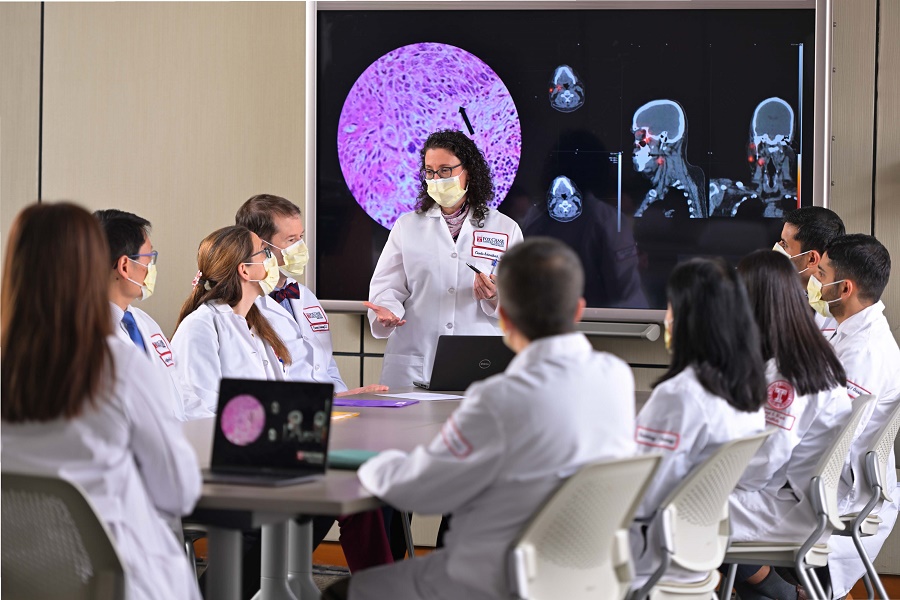Head and Neck Cancers Can Be Incredibly Hard to Treat. This Philly Tumor Board of Physicians, Clinicians, Social Workers, and Therapists Offer a Comprehensive Solution.

As cancer treatment has improved, achieving clinical goals has become more complex. An exponential array of medical technologies and innovations allows physicians to cure patients and extend many more lives through long-term, carefully managed treatment.
“Caring for individuals with head and neck cancer involves many clinical, social and psychological issues,” says Dr. Cecelia Schmalbach, Chief, Division of Head and Neck Surgery, Fox Chase Cancer Center, Professor and Chair, Department of Otolaryngology-HNS, Lewis Katz School of Medicine at Temple University. “We work as a multidisciplinary team, collaborating throughout treatment to manage a patient’s cancer, preserve speech and swallowing function and appearance which is so important for quality of life, and to reduce the risk of recurrence.”
“The good news is we now can manage patients with head and neck cancer for a long time,” says Dr. Jeffrey Liu, attending surgeon and Associate Professor in the Department of Surgical Oncology. “However, when removing a tumor or treating it, preserving someone’s ability to eat, drink, and swallow must be part of the equation, or else it’s not much of a cure.”
“Unlike patients with other cancers, individuals who have lost their voice box or have difficulty eating are easily noticeable to the world at large,” Liu says. Psychosocial issues with these cancers are common.
Tumor Boards: The sum of everyone’s knowledge
To ensure that the complicated and interconnected aspects of head and neck cancer diagnosis and treatment are systematically addressed, Schmalbach, Liu, and many other specialists attend a Fox Chase Head and Neck Tumor Board each week. Here, surgeons, medical oncologists, radiation oncologists, speech therapists, plastic surgeons, social workers, and clinical trial coordinators discuss cases, share knowledge, and arrive at a consensus for an optimal treatment plan.
“A large multidisciplinary Head and Neck Tumor Board is crucial for optimal care,” explains Dr. Curtis Miyamoto, Associate Director for Clinical Services, Fox Chase Cancer Center at Temple University Hospital; Chair, System Integration Committee, Oncology, Temple University Health System; Professor, Radiation Oncology, Lewis Katz School of Medicine at Temple University, “Medical knowledge doubles every 70 days and keeping up with its advances and setbacks is impossible for one specialty. Our robust Board aggregates the sum of our knowledge and experience on behalf of the patient.”
“During any Board meeting, we might discuss how fast or slow someone’s cancer is growing, whether it is responding to current treatment, if it has metastasized or spread to other parts of the body, and its unique genetic markers,” Schmalbach says. From a psychosocial aspect, issues such as maintaining nutrition throughout treatment and even getting patients without transportation to the hospital are reviewed.
“This is truly an era of personalized medicine where we now understand that each person’s cancer is a unique disease entity in its tumor pathology and molecular signature—characteristics that enable us to determine an optimal treatment plan for a patient,” says Dr. Jessica Bauman, Chief, Division of Head and Neck Medical Oncology.
A Delicate Balance
“It’s always a balancing act when the Board recommends a particular treatment regimen for a patient, since all treatments come with side effects; it’s a question of whether the benefits of the treatment outweigh its risks,” says Thomas Galloway, Chief, Division of Head and Neck Radiation Oncology, and Professor, Department of Radiation Oncology.
Coordinating Care, Reducing Risk
“As soon as a patient comes to us with a cancer diagnosis, the Tumor Board is on the clock to get that patient treatment,” Liu says. “There are many decisions to make and actions to take, and the Tumor Board allows us to ensure their treatments occur as efficiently as possible.”
“For example, having a speech therapist on the Tumor Board helps us determine the best way to treat someone whose cancer is affecting their voice box, and if function can be retained after surgery,” Liu says. Many life-changing decisions must be considered.
Once consensus is reached and a treatment plan decided on, the surgeon, radiation oncologist and medical oncologist coordinate with speech therapists, plastic surgeons, and other allied healthcare specialists, creating a timeline so that treatment and recovery occur concurrently. That’s a critical point because, with cancer treatment, timing is everything.
The Role of the Social Worker
On that point, social workers are essential in ensuring the treatment process is streamlined. Cancer treatment demands a lot from patients, and for some, even getting to the hospital five days a week for radiation is challenging, particularly those facing obstacles related to economic inequality. Social workers can help a patient find affordable travel, sort out insurance issues and act as a point person so the patient can start treatment as quickly as possible. And a significant factor affecting outcomes is Fox Chase social workers identify problems early on, sometimes well before treatment is even initiated to head off problems before they become problems.
Access to Advanced Clinical Trials
A powerful benefit of the Fox Chase Head and Neck Tumor Board is that clinical trial coordinators are an integral part of the discussions.
The eligibility for participation in a study is precise and nuanced. It can include the stage of cancer, involved lymph nodes, a smoking history, and kidney function. Trial coordinators understand the detailed criteria for each Head and Neck cancer study, and during the Tumor Board meeting, in real-time, can focus on a patient who might be an eligible candidate for an innovative trial.
That can be transformative for patients because clinical trials provide access to the most advanced approaches. And, in head and neck cancers, there is new vital research in the area of de-intensification, which attempts to tailor the intensity of treatment to the individual to avoid as many side effects as possible.
“We’re learning more and more about how to identify the exact level of treatment that each patient needs,” says Bauman. “And through these clinical trials, we’re providing the best care possible—and gaining crucial data on how to treat these patients moving forward.”
This is a paid partnership between Fox Chase Cancer Center and Philadelphia Magazine
